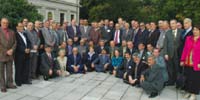Training Iraqi Judges

 3:06
Scott Carrier
3:06
Scott Carrier
Getting them ready to issue rulings.
Broadcast: Mar 4 2005 on NPR Day to Day Subjects: War, Public Affairs, International
Interview: Markus Zimmer talks about training Iraqi judges for presiding over cases involving Saddam Hussein and his aides
March 4, 2005 from Day to Day
ALEX CHADWICK, host: Also in Iraq, Saddam Hussein's chief lawyer is urging authorities to delay the trials of the former dictator and his aides for at least another year because, the lawyer says, the country is too dangerous. This comes after an Iraqi judge and his son were gunned down earlier this week outside their home in Baghdad. In Salt Lake City, Utah, a US District Court clerk, Markus Zimmer, leaves his home periodically to travel to Europe, to Prague in the Czech Republic, where he trains Iraqi judges. The effort is sponsored by the International Legal Assistance Consortium in Sweden and funded by the British government. Markus Zimmer speaks here on his own behalf, not as a representative or employee of any government.
Mr. MARKUS ZIMMER (US District Court Clerk): The Iraqi judges were, in my experience, among some of the most mature, some of the most learned and some of the most professional I have met during my international development work. They took their positions very seriously. They typically were older. I would say approximately 10 to 15 percent of them had PhDs in law, which is very, very unusual. And they have a very, very keen sense for what is right and wrong.
The overwhelming concern they all share is personal security and the security of their families. They see their colleagues being assassinated. They are afraid to go out onto the street. Even judges who are neighbors are afraid to visit each other in their homes because they say there are professional mafia-type snipers that are after them. In effect, they're paralyzed by these fears. They continue to go to work, but they acknowledge that their judicial independence risks being compromised because of the fear that they have and that when they are writing their opinions or making decisions in cases, this notion of fear for personal safety and for the safety of their families can be a factor sometimes in how they decide their cases.
One of the judges described it as an all-out effort on the part of the insurgents, the terrorists, whoever these people are, to destroy the intellectual fabric of Iraqi society. They're not only going after judges; they're going after scholars, they're going after highly regarded academicians, they're going after, in effect, the intellectual elite. You get rid of them, and it's much easier to manipulate, you know, the populace. We've seen that pattern in history over and over again.
CHADWICK: Markus Zimmer has been volunteering to train Iraqi judges. And thanks for that interview to Scott Carrier of Hearing Voices.
NPR's DAY TO DAY continues. I'm Alex Chadwick.

